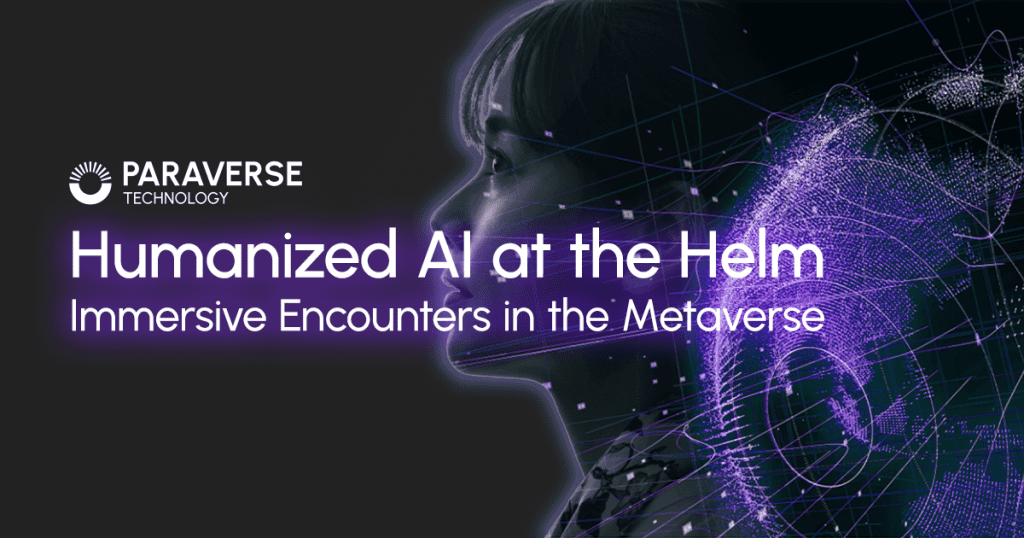
Humanizing AI: Elevating Virtual Engagement In the Metaverse
In the ever-changing metaverse, virtual interactions are becoming more immersive and realistic, blurring traditional boundaries. Leading this transformation is humanized generative AI, revolutionizing virtual engagement by infusing AI with human-like qualities. This pioneering approach fosters authentic connections and offers personalized experiences, catalyzing collaboration and creativity. This advancement represents a significant shift in socialization and interaction, embodying the following key elements:
Authentic and Engaging Experiences: AI algorithms emulate human behavior and responses, crafting immersive experiences that create meaningful connections within the metaverse.
Iterative Learning Process: Humanized AI-powered avatars continuously learn and adapt based on user interactions, ensuring dynamic and ever-evolving social experiences, enhancing user engagement.
Collaboration and Creativity: Humanizing generative AI enables seamless collaboration and sparks creativity within the metaverse, empowering users to create innovative virtual experiences mirroring real-world interactions.
This convergence of humanized AI and the metaverse redefines virtual interactions and lays the foundation for a future with increasingly blurred lines between the physical and digital realms.
Empowering Realism: Decentralized Cloud Rendering's Influence on Humanized AI
The capturing and real-time display of subtle facial expressions and gestures are crucial. AI algorithms are now used to produce real-time responses, dialogue, and content that closely mimic human behavior through the processing and analysis of extensive datasets, including visual data, speech synthesis, text-to-speech, text-to-audio, text-to-video like the rise of Sora, and natural language processing. Achieving this level of realism requires robust hardware and substantial computing resources. Decentralized rendering technology plays a pivotal role in driving the widespread adoption of humanized AI, enabling seamless interaction between humans and AI agents, as well as among AI agents themselves.
Transformation of the Rendering Landscape: Decentralized rendering technology has harnessed the computational power of multiple devices to distribute the workload, significantly reducing rendering times while maintaining exceptional output quality.
Empowerment of AI Algorithms: This transformative impact empowers AI algorithms to analyze and generate highly realistic and detailed content, including lifelike images, 3D models, and interactive virtual environments.

The advantages of decentralized real time cloud rendering are pivotal for the future of generative AI, offering:
- Efficiency and Scalability: Through distributed networks to handle complex tasks efficiently, resulting in the creation of highly realistic and immersive content that enhances the human-like elements of generative AI.
- Diverse Applications: Extending across various sectors, offering new possibilities for entertainment, design, healthcare, and beyond, fostering collaboration and creativity and creating opportunities for innovation in diverse domains.
- Enhanced Realism and Authenticity: Distributed rendering produces detailed and lifelike media, improving user engagement with AI-generated content.
- Faster and More Efficient Content Generation: Utilizing combined processing power for reduced rendering times, enabling interactive applications and real-time experiences.
- Scalability and Cost-Effectiveness: Allowing for easy scalability through networked devices, while reducing costs associated with AI content generation.
Catalyzing Sectoral Transformation
Humanizing AI goes beyond just social entertainment and has diverse applications. The ongoing advancement of decentralized rendering technologies presents new possibilities for humanized generative AI. This synergy has the potential to redefine our interactions with virtual environments, ensuring that they remain advanced yet profoundly human.

Gaming and Social Entertainment
Humanized generative AI technology is revolutionizing the creation of lifelike and interactive virtual characters, nuanced NPCs, influential avatars, and digital humans. Decentralized rendering technology is enabling AI-driven interactive gameplay and the development of highly realistic and immersive virtual experiences in video games, animated movies, and virtual events such as concerts. This advancement is enhancing personalization and immersion, ultimately providing enjoyable entertainment experiences for users.

Healthcare and Therapy
Boost medical imaging, diagnostic, and treatment planning efficiency, precision, and outcomes. Humanizing AI personalizes medical advice and treatments. Patient interactions with virtual doctors, therapists, and companions revolutionize healthcare. Decentralized rendering technology for 3D models enables VR simulators, 3D printed anatomical models, virtual surgical planning, surgical guides, instrumentation, and implants to improve patient care.

Education and Training
Through AI-powered personalized and interactive learning under decentralized rendering, students are fully immersed in virtual classrooms, gamified learning, simulation training, and multisensory learning experiences, fostering collaboration and interacting with even AI tutors and mentors in real time regardless of teaching mode.

Travel and Culture
AI metaverse interaction allows users to use virtual travel platforms to explore and interact with attractions and cultural heritage sites worldwide. Decentralized real-time rendering and human-centric generative AI enable lifelike virtual guides and AI vacation assistants that offer customized travel recommendations and services. Facilitating multilingual translation and cultural exchange promotes cross-cultural understanding and friendship, bolstering the travel and cultural experience.

Advertising and Promotion
Human-centric generative AI predicts consumer behavior, enabling e-commerce platforms to personalize customer service and shopping experiences, ultimately improving customer satisfaction, loyalty, and conversion rates. Photorealistic 3D renderings and animations make interactive and personalized AR and VR advertisements that resonate with modern consumers, increasing consumer interaction and brand engagement in the visually-driven digital landscape.
ParaLab: Decentralized Real-Time Cloud Rendering
ParaLab, developed by Paraverse Technology, leads digital parallel world technology with its advanced decentralized real-time cloud rendering network. This technology enhances the visual appeal, responsiveness, and scalability of humanized AI-powered avatars and services within the metaverse, ensuring an unparalleled user experience through exceptional high-performance and ultra-low latency rendering capabilities.
By unifying the strength of multiple GPUs, ParaLab seamlessly delivers AI-generated content, fostering a metaverse experience characterized by realistic graphics, responsive behavior, and advanced conversational capabilities, highlight the key values
- Real-Time Cloud Rendering: ParaLab harnesses decentralized real-time cloud rendering, offering high-quality 3D environments for real-time exploration and interaction.
- Humanized AI Interactions: ParaLab’s technology is tailored to support humanized AI interactions, fostering a seamless and engaging metaverse where users can communicate and collaborate effortlessly.
- Scalable Ecosystem: Embracing a decentralized approach for the ecosystem that is capable of supporting intricate 3D environments, irrespective of the user’s device capabilities.
The synergistic relationship between ParaLab, decentralized real-time cloud rendering, AI algorithms, and emerging technologies such as virtual reality and augmented reality signifies a paradigm shift in the interaction with human-centric AI-generated content and services. Furthermore, ParaLab’s distributed rendering process encourages collaboration and knowledge sharing among AI developers, enhancing the understanding of human preferences and emphasizing the critical role of decentralized technology in AI rendering.
Envisioning the Future Landscape
As decentralized rendering technology continues to advance, its transformative impact on the trajectory of humanized generative AI in the technological sphere becomes increasingly profound. This convergence has not only unlocked new possibilities in the metaverse but also empowered users to actively participate in shaping a parallel digital world. ParaLab, developed by Paraverse Technology, stands at the forefront of this revolution, pioneering innovative solutions that redefine the potential within the metaverse.
Ongoing advancements in distributed computing, network infrastructure, rendering algorithms, and the integration of decentralized rendering technology with edge computing and IoT devices are poised to significantly impact VR and AR. These advancements will revolutionize industries such as gaming, education, healthcare, and training by enabling the development of highly immersive and realistic virtual worlds. The future of decentralized rendering technology holds immense promise for advancing humanized generative AI, contributing to the co-creation of a Digital Parallel World.
ParaLab plays a pivotal role in shaping the future of humanized generative AI development.
